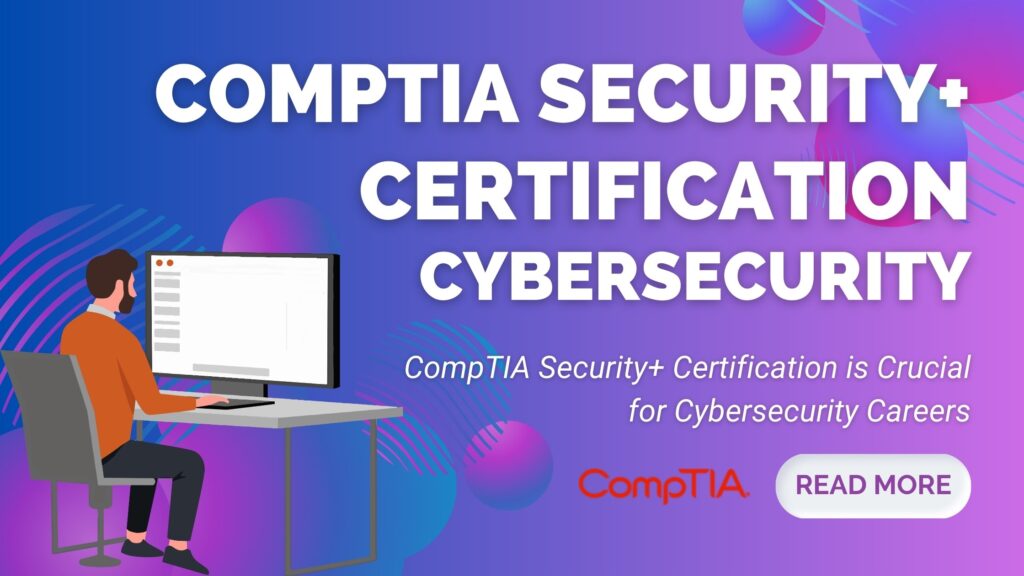If you’re interested in a career in cybersecurity, the CompTIA Security+ Certification is a certification you won’t want to miss. It’s an internationally recognized certification that confirms your foundational skills and knowledge in cybersecurity.
What does the CompTIA Security+ Certification cover?
The CompTIA Security+ Certification consists of six domains that cover a range of skills and knowledge essential to building a successful career in cybersecurity. Let’s take a closer look at each of these domains:
Domain 1: Threats, Attacks, and Vulnerabilities
This domain covers the skills and knowledge necessary to identify and analyze various types of threats, attacks, and vulnerabilities. It includes reconnaissance techniques, social engineering attacks, malware, and wireless attacks.
The domain covers:
- Different attack vectors, malware types, social engineering attacks, and common attack methods and tools exist.
- Techniques to identify vulnerabilities, threat intelligence, and threat hunting methodologies.
- Analysis of network traffic, forensics tools and techniques, and best practices for incident response and recovery.
Domain 2: Technologies and Tools
This domain covers the skills and knowledge necessary to use a variety of technologies and tools to secure networks and devices. It includes topics such as firewalls, intrusion detection and prevention systems, secure email, and virtual private networks (VPNs).
The domain covers:
- Different types of security technologies, including firewalls, intrusion detection and prevention systems (IDS/IPS), and content filtering.
- Cryptography concepts, including symmetric and asymmetric encryption, hashing, and digital signatures.
- Types of secure protocols and services, including secure email, virtual private networks (VPNs), and secure file transfer.
Domain 3: Architecture and Design
This domain covers the skills and knowledge necessary to design and implement secure network architectures and systems. It includes topics such as network segmentation, secure network topologies, and secure mobile device deployment.
The domain covers:
- Different types of network architectures, including WANs, LANs, and wireless networks, and best practices for network segmentation.
- The role of different network devices, including routers, switches, and load balancers, and their security implications.
- Secure mobile device deployment, including mobile device management (MDM) and mobile application management (MAM).
Domain 4: Identity and Access Management
This domain covers the skills and knowledge necessary to manage user identities and access to network resources. It includes topics such as authentication and authorization, account management, and identity and access-related attacks.
The domain covers:
- Different types of authentication mechanisms, including passwords, biometrics, and smart cards, and best practices for user authentication.
- Account management, including account provisioning and de-provisioning, password policies, and user roles and permissions.
- Identity and access-related attacks, including phishing attacks, denial of service attacks, and man-in-the-middle attacks.
Domain 5: Risk Management
This domain covers the skills and knowledge necessary to assess and manage risks to information systems. It includes risk analysis, incident response, business continuity, and disaster recovery planning.
The domain covers:
- The principles of risk management, including risk assessment, risk treatment, and risk mitigation.
- Incident response and disaster recovery planning, including incident response team organization and incident response procedures.
- Business continuity planning, including backup and recovery procedures, off-site data storage, and data restoration procedures.
Domain 6: Cryptography and PKI
The final domain covers cryptography and public key infrastructure (PKI). This includes encryption algorithms, digital signatures, and key management. Students will learn how to properly use and implement these technologies to protect data and ensure secure communications.
By passing the CompTIA Security+ certification, students will have a thorough understanding of these key domains and be equipped with the skills needed to identify and mitigate threats to an organization’s security. This certification is highly valued in the cybersecurity industry, making it a good investment for those pursuing a career in this field.
Why Pursue a CompTIA Security+ Certification?
The cybersecurity industry is evolving, with many organizations seeking qualified professionals. By pursuing a CompTIA Security+ certification, you can stand out from the crowd and demonstrate your knowledge and skills to potential employers. This certification is also a great way to advance your career and potentially increase your earning potential.
If you’re serious about a career in cybersecurity, the CompTIA Security+ Certification is a must-have certification. It covers essential topics in cybersecurity and prepares you for a wide range of cybersecurity roles. Obtaining this certification will help you stand out in a crowded job market and demonstrate your commitment to a career in cybersecurity.
Sources for the article :
Citations:
[1] https://www.comptia.org/faq/security/why-should-i-get-comptia-security-certified
[2] https://www.comptia.org/faq/security/what-jobs-can-i-get-with-comptia-security-certification
[3] https://www.comptia.org/blog/how-cybersecurity-can-boost-your-career
[4] https://www.comptia.org/blog/comptia-security-jobs
[5] https://www.comptia.org/blog/is-security-plus-worth-it
[6] https://www.comptia.org/faq/security/how-much-can-i-make-with-a-comptia-security-certification
[7] https://www.comptiatech.org/blog/detail/why-the-comptia-security-is-important


